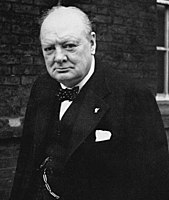Conservative Government 1951–1955
| Third Churchill ministry | |
|---|---|
| 1951–1955 | |
 |
|
| Date formed | 26 October 1951 |
| Date dissolved | 6 April 1955 |
| People and organisations | |
| Head of state |
|
| Head of government | Sir Winston Churchill |
| Deputy head of government | Sir Anthony Eden |
| Total no. of ministers | 149 appointments |
| Member party | Conservative Party |
| Status in legislature | Majority |
| Opposition party | Labour Party |
| Opposition leader | Clement Attlee |
| History | |
| Election(s) | 1951 general election |
| Legislature term(s) | 40th UK Parliament |
| Predecessor | Second Attlee ministry |
| Successor | First Eden ministry |
Winston Churchill formed the third Churchill ministry in the United Kingdom after the 1951 general election. He was reappointed as Prime Minister of the United Kingdom by King George VI and oversaw the coronation of Queen Elizabeth II in 1953.
The Conservative Party came to power in the United Kingdom after victory in the 1951 general election. This was the first purely Conservative government since Stanley Baldwin's 1924–1929 ministry. Winston Churchill became Prime Minister for a second time. Churchill's government had several prominent figures and up-and-coming stars. Rab Butler was appointed Chancellor of the Exchequer while Sir Anthony Eden returned as Foreign Secretary. The noted Scottish lawyer Sir David Maxwell Fyfe, who had gained fame as a prosecutor at the Nuremberg Trials, became Home Secretary. He remained in this post until 1954, when he was ennobled as Viscount Kilmuir and appointed Lord Chancellor. Future Prime Minister Harold Macmillan achieved his first major post when he was made Minister of Defence in 1954.
Gwilym Lloyd George, younger son of former Liberal leader David Lloyd George, replaced Sir David Maxwell Fyfe as Home Secretary in 1954. Florence Horsbrugh became the first woman to hold a cabinet post in a Conservative government when she was appointed Minister of Education in 1951. Several figures who were later to achieve high offices held their first governmental posts. These included future Prime Minister Edward Heath, future Chancellors Reginald Maudling, Peter Thorneycroft and Iain Macleod and future Foreign Secretary Lord Carrington. Other notable figures in the government were John Profumo, Bill Deedes, David Ormsby-Gore and the Marquess of Salisbury.
...
Wikipedia
